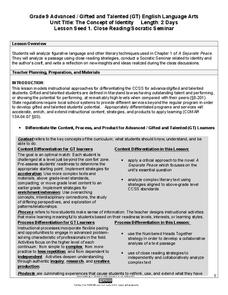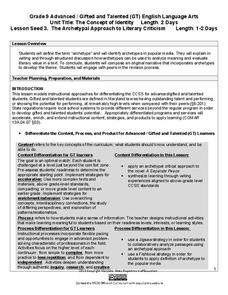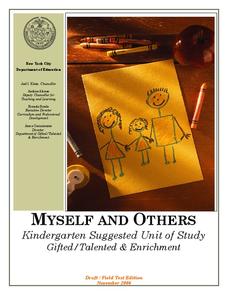Teaching Tolerance
Identity Artifacts Museum
Who are you? It's a simple question, but younger learners have the opportunity to express their complex identities by making artifacts that represent parts of their identities. After engaging in the activity, they share who they are with...
Thoughtful Learning
Using Positive Self-Talk
Boost positive self-talk with a chart that turns negative feelings into happy ones. Scholars write down their negative emotions then rewrite them with a positive flair to aid in changing their outlook.
Thoughtful Learning
Checking the Emotion Thermometer
A hand-drawn thermometer provides a strong visual for how much of an emotion a child is feeling. Scholars color the thermometer's mercury to showcase whether what they are feeling is high or low at a certain moment. Questions allow...
PBS
Latino Americans Share Their Experiences
Three Latino Americans are the focus of an interactive that spotlights their accomplishments. Scholars get to know Lin-Manuel Miranda, Judy Reyes, and José Hernández through short informative text and videos. Participants read, take...
Facebook
Respect and Boundaries
Respect is a must-have in healthy relationships! Pupils explore their boundaries and identify the elements of respect during a lesson from a library of digital citizenship activities. The teacher's resource section contains a printable...
Facebook
Who Do You Want to Be?
Can posting art or music online lead to the career of your dreams? Inquisitive individuals consider their social media presence with a instructional activity from a series focusing on identity exploration and digital citizenship. Pairs...
Facebook
Different Perspectives
What do people's social media profiles say about them? Explore diverse perspectives and digital citizenship in an activity designed with self-identity in mind. Pupils reflect on their own profiles, then collaborate to examine...
California Department of Education
Who Am I?
Get in touch with your sense of self! The fifth and final lesson in a series of college and career lessons for fifth graders reinforces the relationship between interests and career choices. Pupils play a scenario-driven game, then dig...
Little Stones
How Can Poetry Make People Think and Care?
Can beautiful words change the world? Literary scholars discover how to paint their visions of change using poetry in a series of three workshops. Each independent topic gives participants a chance to examine their feelings about...
California Department of Education
What Matters to Me?
Whether you're a self-starting entrepreneur or a cubicle commando, finding a career that suits your personality is a must! The second lesson in a series of five career and college lesson plans focuses on work ethic and values. Learners...
Leadership Challenge
Inspire Students Today to Make a Difference in the Future
Your search for a year's worth of leadership lessons is over! A lesson in a character education series provides a full two semesters of inspiring leadership activities. The resource includes individual and group challenges to ensure a...
Hastings Prince Edward Public Health
What is Health?
Many indicators of health are beyond a teenager's control, but there are many changes they can make in their daily life that can improve their health. Middle schoolers think about their physical, social, and mental health status before...
Project B.A.S.I.C. Child Development Specialist and Child Care Consultation
Better Attitudes and Skills in Children
Little kids often have very big feelings, and need help expressing them. A set of social emotional lessons provide tangible ways for young elementary learners to visualize their emotions, focus on clear communication, and channel their...
Maryland Department of Education
The Concept of Identity Lesson 1: Close Reading/Socratic Seminar
John Knowles' A Separate Peace provides readers with an opportunity to develop their close reading and analytical skills as they look for what Knowles feels are the factors that shape our identity.
Maryland Department of Education
The Concept of Identity Lesson 5: Motivation - Maslow's Hierarchy of Needs
Maslow's Hierarchy of Needs provides the lens class members use to analyze and evaluate the motivations of the characters in Sylvia Plath's "Initiation" and scenes from Mean Girls. Readers then select a character from A Separate...
Maryland Department of Education
The Concept of Identity Lesson 3: The Archetypal Approach to Literary Criticism
As class members continue their study of approaches to literary criticism, readers examine the symbolism and archetypal patterns in John Knowles' A Separate Peace, and how these parallels are used to develop a theme in the story.
Maryland Department of Education
The Concept of Identity Lesson 2: The Historical/Biographical Approach
"How does our environment shape our identity?" After researching biographical information about John Knowles and considering how these experiences are reflected in A Separate Peace, class members consider the strengths and weaknesses of...
University of British Columbia
The Outsiders: Identity, the Individual, and the Group
S.E. Hinton's The Outsiders is the anchor text in a unit that asks readers to reflect on their own identity, their place in their family, in groups with which they identify, and in school.
New York City Department of Education
Myself and Others
Self reflection is an important skill to reinforce in our children, and it's especially helpful to help them realize who they are in the context of their environment. A collection of lessons about self image and community encourage...
Council for the Curriculum, Examinations and Assessment
Relationships and Sexuality
Adolescence is a tumultuous time for the learners in your class. Guide them through the rocky world of friendships, risks, personal health, and emotional turmoil with a set of lessons about teenager relationships and sexuality.
Council for the Curriculum, Examinations and Assessment
Safety and Managing Risk
Teenagers love to take risks to test their personal boundaries, but many risks are too dangerous to try. The set of exercises in this packet teach your class about the ways they can stay safe and protect themselves while still having fun.
Council for the Curriculum, Examinations and Assessment
Morals, Values and Beliefs
Your personality is based on the things you believe in, the morals you abide by, and the values upon which you make your decisions. Delve into a set of lessons about values and moral framework with your eighth graders as they explore and...
Council for the Curriculum, Examinations and Assessment
Managing Change
Adolescence and teenage years are very difficult in terms of emotions, primarily due to the amount of change going on in growing teens' lives. Guide middle schoolers through disruptive changes and transitions with a set of activities...
Council for the Curriculum, Examinations and Assessment
Self Concept
Reflect on your identity, the past events that helped you form your personality, and your future aspirations with a lesson about self concept. Eighth graders examine their own traits and the ways they are unique from their peers before...

























